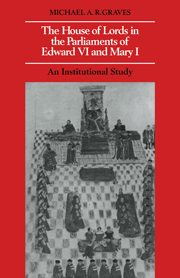Book contents
- Frontmatter
- Contents
- Dedication
- Preface
- Parliamentary sessions, 1547–8
- 1 Introduction
- 2 The composition of the House
- 3 The quality of the House
- 4 Attendance and activity, absenteeism and management
- 5 Cohesion and division
- 6 The Lords' inheritance: clerks and assistants to the House
- 7 The rules of business: procedure
- 8 The legislative record of the mid-Tudor Lords
- Abbreviations
- Appendix A Composition
- Appendix B Roll of the ‘actual’ members of the House of Lords, 1547–58
- Appendix C Attendance
- Appendix D Legislation
- Notes
- Select bibliography
- Index
4 - Attendance and activity, absenteeism and management
Published online by Cambridge University Press: 03 May 2010
- Frontmatter
- Contents
- Dedication
- Preface
- Parliamentary sessions, 1547–8
- 1 Introduction
- 2 The composition of the House
- 3 The quality of the House
- 4 Attendance and activity, absenteeism and management
- 5 Cohesion and division
- 6 The Lords' inheritance: clerks and assistants to the House
- 7 The rules of business: procedure
- 8 The legislative record of the mid-Tudor Lords
- Abbreviations
- Appendix A Composition
- Appendix B Roll of the ‘actual’ members of the House of Lords, 1547–58
- Appendix C Attendance
- Appendix D Legislation
- Notes
- Select bibliography
- Index
Summary
An examination of the quality of a parliamentary assembly acquires substance and meaning only when it is related to actual performance. The fact that the Lords was blessed with a wide spectrum of talents, abundant experience and the appropriate legislative skills, becomes irrelevant if the members endowed with these particular qualities did not attend regularly and shoulder the main burden of business. Even if they did, a second question interposes itself: did they enjoy freedom of action or did they simply bow to royal directives? The conundrum can be expressed in institutional terms: was the Upper House efficient in practice, and was it something more than a rubber stamp to royal policies and a constitutional support to the Crown's authority?
The Lords' attendance record provides a precise record of who turned up and who stayed away. More problematical is the motivation: whether their presence or absence was determined by the political interests of the Crown. Vernon Snow and Helen Miller disagreed about the pre-Edwardian situation, the former arguing that the privy council perfected its managerial techniques in the early forties by manipulating attendance, and the latter denying that, by then, there existed serious managerial problems. Whatever the answer, it sheds no light on the problem whether the Upper House was effectively controlled in the two succeeding reigns.
- Type
- Chapter
- Information
- The House of Lords in the Parliaments of Edward VI and Mary IAn Institutional Study, pp. 58 - 94Publisher: Cambridge University PressPrint publication year: 1981



